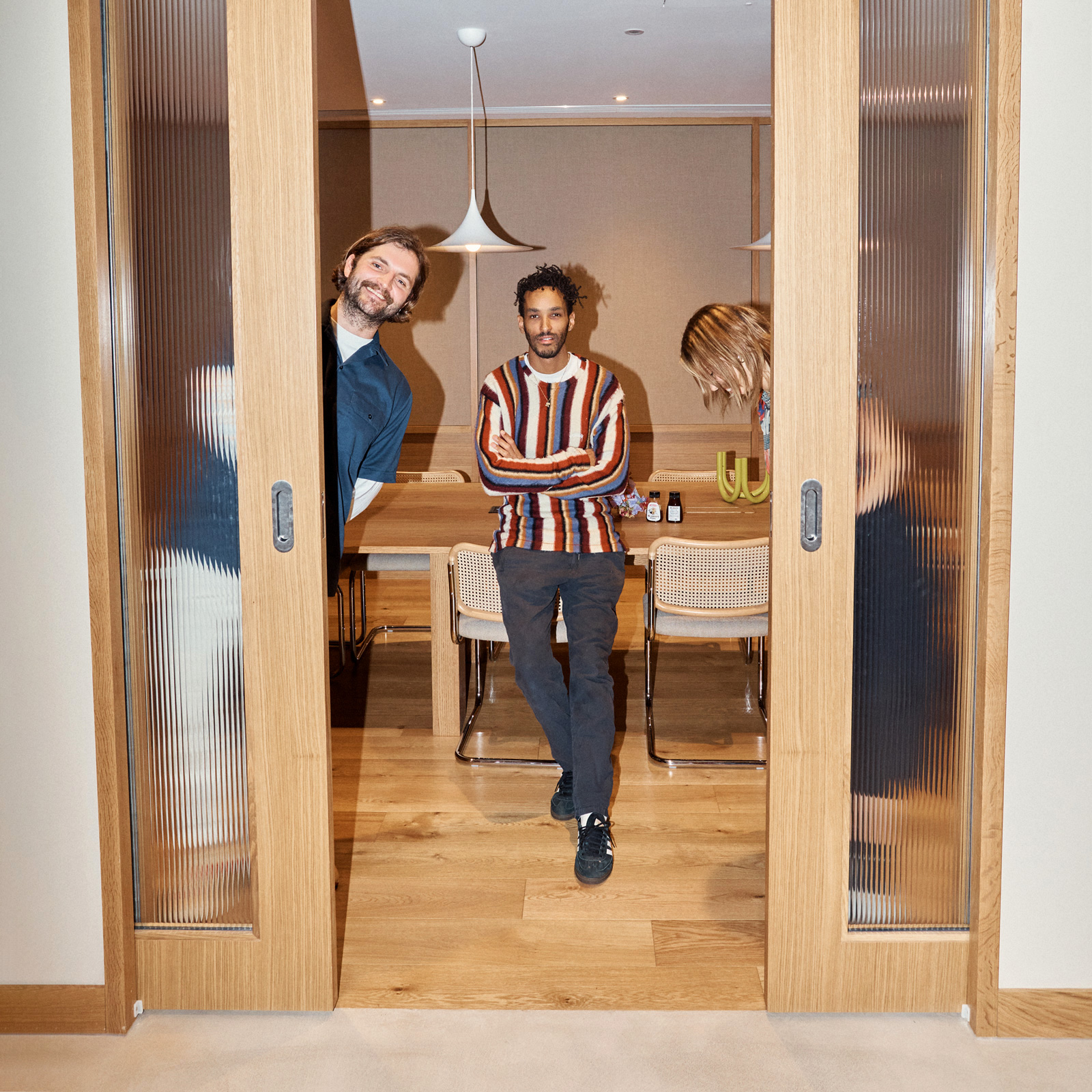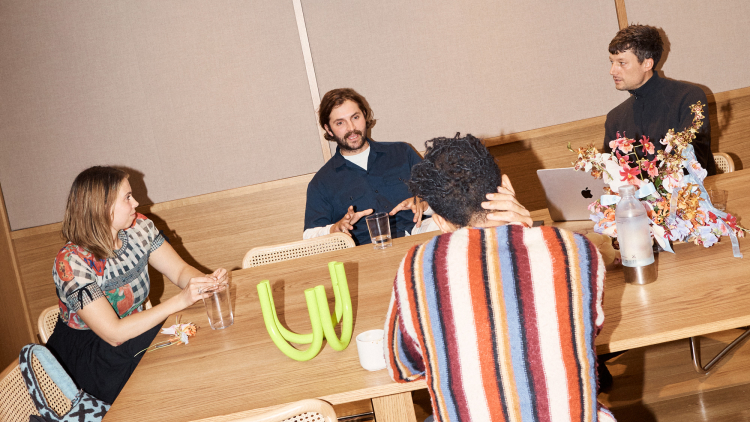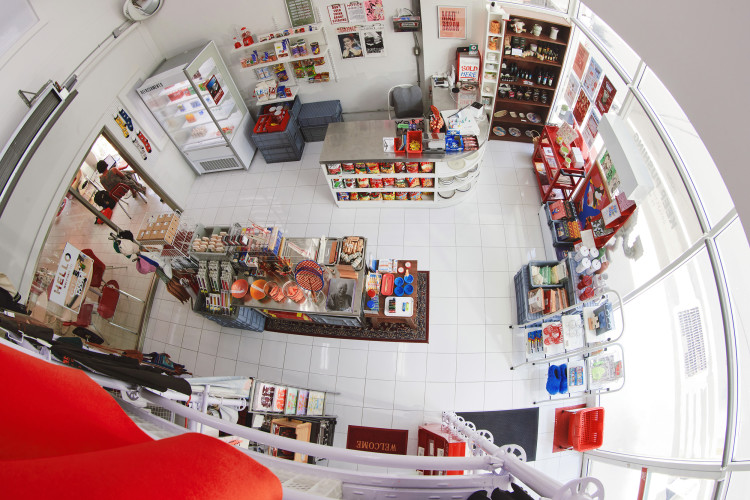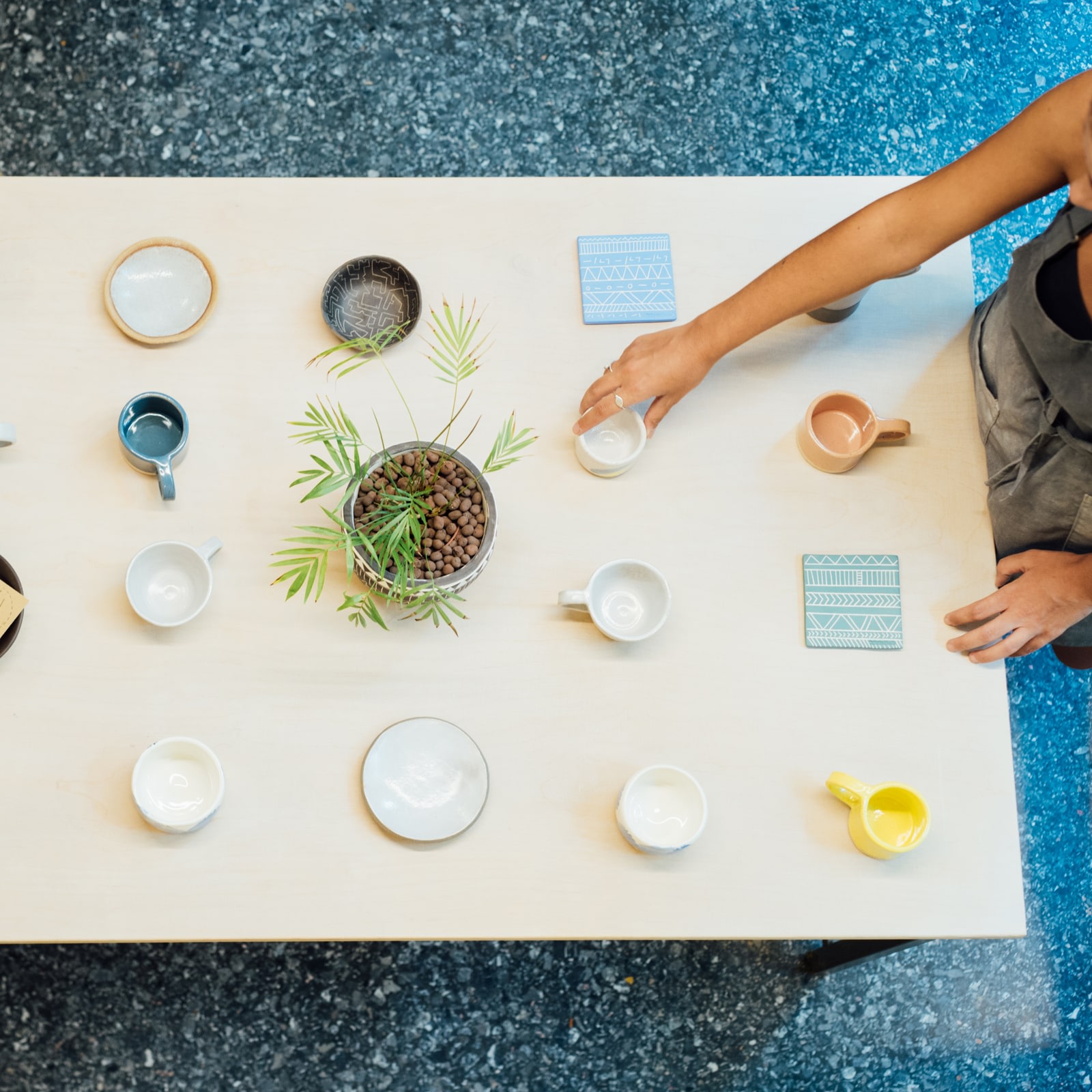
On the face of it, they don’t have much in common. One works in flowers, the other two in food and product design. Yet on a recent midweek afternoon, Courier’s editor, John Sunyer, brought together three founders from various backgrounds to explore what it’s really like to start something on your own.
The resulting two-hour conversation covers everything from when to make the jump and work/life balance to getting your personal branding right (without making you cringe). The conversation covers the late nights, the lonely moments, the times you have to check yourself. And yet none of them would have it any other way. What’s more, the ups and downs across their very different industries share more similarities than you might think.
Featuring the product designer with a background in carpentry, ceramics and metalwork fabrication, Andu Masebo. His work was recently exhibited at V&A South Kensington as part of London Design Festival. Emily Davies is the founder of floral design studio Athyln, working on floral set design for film and music videos, editorials and events. Her clients include Travis Scott, Dua Lipa, Burberry, Dazed and Jacquemus. Ben Lippett is a chef and recipe developer. As well as working at online cooking and content platform Mob, he’s the co-founder of Dr Sting’s Hot Honey and recently launched his own weekly newsletter on Substack, How I Cook. All of them are based in London.


Making the jump
JOHN Ben, you almost have three separate jobs. That’s two more than the average person. Or in other words: quite a lot. BEN Yep. In some ways it's normal for me to combine various jobs, bouncing from one to the other. But the idea of working for just myself is ultimately the most attractive, so eventually something will have to give. Side note – it’s weird how people working at big companies rarely talk about leaving. JOHN It’s almost a taboo. Even though it’s completely inevitable and normal. BEN Exactly. JOHN Emily, Andu – I’m guessing that working for yourself is also a big motivation? ANDU Working for myself, and only for myself, would be ideal. But I also have a few other jobs. I just don’t talk about them openly. They don’t demand much from me. So I do them one or two days a week, which enables me to earn enough money to cover my overheads for my product design. JOHN You almost want a money job to be something so uninteresting that it doesn’t take up too much mental space. ANDU It’s also about the job not being in the exact same industry, so you don’t come into contact with somebody you might want to collaborate with one day. Because, you never know, they might start to view you in a particular way. JOHN The way we live and work today is changing fast. Taking on extra jobs while you sort out your dream line of work is becoming much more common, for example. But that takes a lot of energy… ANDU I don’t want to play the violin and talk about wealth… But I have the skills that I do because I’ve had to hustle. Whereas if, say, I had a lot of wealth to start with, I probably wouldn’t be the designer that I am today. JOHN From what you’re saying, it’s almost the opposite of ‘Quit Your Job And Go All In On Your Side Hustle’... BEN I was never a gambler. Launching your own brand or business is a leap of faith. Recently, a friend waited until he had enough money for three months rent before quitting his job. Then he said to himself: ‘Okay, now I have this long to make it work.’ ANDU I’m similar. I’m quite a cautious person. I never quit other jobs to start doing this. Although I do think you should create situations where you have to make it work. It has to be an educated, informed risk. When you’re running your own business, you’re always mitigating risk. The more you invest or spend, the more opportunities arise; but stretch yourself too thin and you shoot yourself in the foot.


Branding
JOHN How do you all feel about personal branding, self-image and putting yourself out there all the time? Is it uncomfortable? EMILY Branding’s something I’m interested in – I just wish it wasn’t me. Putting myself out there is one of the most difficult aspects of my work. If I could remove myself from it, I would. ANDU Same. I’m quite reluctant when it comes to all the branding stuff. I’m more interested in doing the work and making interesting things. But personal branding – you just have to. BEN It can feel uncomfortable; also weird and nerve-racking. And I didn’t get into everything thinking about how important it is to master the craft of creating your own personal brand. But it’s completely necessary. JOHN Online, especially, you’re opening yourself up to anything and everything. Do you ever learn to live with it? EMILY I’m completely worried about it! Some people are great at it. It comes naturally to them. Or maybe they’re not as self-aware as I am. In some ways, I admire them. But I find it hard because naturally I’m quite reserved. BEN Starting out, I felt self-conscious and analyzed everything I was doing. But the more you do it, the inhibition melts away. You care less about what people think. Maybe that’s unhealthy, I don’t know. But I feel lucky that Mob taught me lots about how to create a consistent brand, how to make sure everything’s cohesive with a particular visual style. And it does get easier. ANDU I think I represent something of change in the design world. I’ve got a very uneasy relationship with it. Part of it comes from the fact I didn’t go to design school before I learned to make objects. I didn’t get taught about design before I formed my opinions of how objects should impact the world, or how they should hold space. So in some ways, my brand is almost a kind of anti-brand. If certain aspects of the design industry would do something a certain way, I kind of do the opposite. EMILY I’ve only ever done everything by myself – Instagram, TikTok, the website. A lot of thought goes into it, because it’s so personal, and I’m quite stubborn about how it all comes together. I think that’s probably stopped me from growing in certain ways, or getting certain jobs. But I would rather have a strong identity than compromise on something. JOHN Such as? EMILY There are some purples I can’t go near. Also, I hate working with some flowers. Even when clients want them, I'll somehow manage to avoid them.

Work/life balance
JOHN Does work/life balance even exist? In the early stages of building your own businesses, is the concept more of a fantasy? EMILY I think about it a lot. I’m a big supporter of three-day working weeks. Currently, my business is growing enough to let me think about employing staff for the first time. But I want to employ someone in a way that doesn’t exploit them. I’ve had some terrible bosses and jobs in my time. BEN Work/life balance is what got me out of kitchens, really. It motivated me to take my skills and apply them in a more creative way. But as soon as I left the kitchen, I filled all my time with other work. Especially when you're trying to go out and do stuff on your own. There's always a voice in your head going, what else could you be doing? I say yes to a lot of stuff; I should maybe get better at saying no. Even on days off, whenever I pick up my phone, partly because a lot of what I do involves social media, I have to think about work. JOHN What’s your screen time like? BEN Maybe five hours. Some days more. JOHN Same. ANDU When you’re growing your business, it’s hard to get your work/life balance right. I haven’t found the answer. I do know that getting paid for something can really take the fun out of it, which is strange. EMILY Yeah. Working for myself over the past few years, I’ve lost, I don't know… I used to spend a lot of time doing things for myself, simple things like reading. All that stuff used to feed into my creativity. It’s where I drew inspiration from. And that's what I miss.



How it's really going
JOHN Looking back, have things developed as you planned? Any big surprises? ANDU I don't really have a business plan. Any money I have, I use to make more furniture. EMILY I don't have a business plan or anything like that either. When I was younger, I never really thought I’d get an opportunity to do something like this. I did a music video with Travis Scott and a Marvel film quite early on. So, in some ways, I’ve already exceeded expectations. Even so, I’m hard on myself. Just being able to keep doing what I do feels like an achievement in itself. I don’t have a backup plan so I have to make this work. JOHN There’s no going back… BEN We don’t intend for Dr Sting’s to get massive – it’s a low lift, something designed to let me and Jamie [Kaye, the brand’s co-founder] hang out. But the kind of personal brand stuff I do outside of Mob – only in the past 6-12 months have I started making the kind of money that could have an impact on my life. But I have no idea where it will go or how long it will last. Because a lot of it exists on social media, I need to work out how this will still be a thing I do for 10 or 15 years. So right now, I’m thinking about future proofing a lot. ANDU Some of the things happening right now were never in my wildest dreams. But my material reality is very similar to how it was when I started. The business side of things will inevitably have to come in at some point.

Pain points
JOHN What about pain points? What bits suck and don’t seem to get any better? EMILY I enjoy time on my own, but I struggle running a business on my own. I actually don't know how a lot of people manage to do it. I end up talking to myself at the studio or overthinking things far too much. Recently, though, I’ve been working in a shared studio. It makes me feel more normal, and that’s great. ANDU When you make things, you genuinely shorten your life. You inhale toxic fumes and work unhealthy hours. It's brutal physically – you're lifting things, putting pressure on your joints, all these kinds of things. So I think what I'm interested in doing is finding a way to have a more healthy life without imposing that imposition of pain on someone else. Being aware of this informs how I design my products. JOHN Can you elaborate? ANDU So the goal for me isn’t to get so much influence that I can outsource the making to someone else and forget about it. I want to design products that are less painful and dangerous to physically make. EMILY Physicality is an issue for me too. Often, I have to get up at 3.30am, multiple times a week, to go to the flower markets. And it’s something I can’t let go of. It’s an important part of the work. Yet it means I work 18/20 hour days sometimes. JOHN Is that just when you’re doing a big event, or is it fairly common? EMILY In busy periods, I could be working three to four events in a week. People think floristry is a glamorous job, but it's really not. You’re lifting things. My hands are all cut up. It takes its toll. JOHN You three must have pretty damaged hands... ANDU When I make things, I use one hand more than the other. My wife says I have an old hand and a young hand. BEN Same story with cooks and chefs. But I love the process. For me, pain points come from the confidence, or lack of confidence, around knowing when it’s time to take the leap – when to take your passion project full time. I’m still figuring out how to manage feelings like: ‘I feel secure. I can do this.’ JOHN Do you all need people that lift you up sometimes? When you’re feeling strung out with work or when your confidence is low? ANDU I actually need people to tear me down a little bit, to be honest. It’s easy for people to be positive off the cuff and tell you, ‘Oh, that's sick!’ But I find that difficult to engage with sometimes because it’s hard to use that comment to push yourself forwards. EMILY There are certain people in my life who, when I’ve turned to them, they’re actually quite harsh. But overall I’m grateful for these kinds of responses, rather than being surrounded by yes people. JOHN Agree. And there are times when people tell you they love something and it makes you think, ‘Huh. Maybe this isn’t very good after all.’ Because the thing they like about it misses the point. Or you receive lots of positivity about a piece of work you spent much less time and effort on than the piece of work you put your heart into. ANDU When someone’s positive or pats you on the back, it’s probably for something you worked on six months ago, and now it's out of your head. And then there are the moments when you need support at midnight in the middle of January – when no-one's interested in what you’re doing. BEN It’s tricky. The rate that I publish things online is quite high. And sometimes it makes me feel disposable: people like it and then it’s gone. So I feel like I have to make something new straight away. The food is there, then you eat it and it's gone. JOHN Same with journalism and making books and magazines. By the time the thing comes out, I might have been working on lots more articles and projects since. I guess it comes back to what we were saying earlier – about staying true to your principles and keeping standards high. That way, it's like the body of work amasses over a longer period of time. It becomes a cumulative thing. It's not a flash in the pan that you want to blow up overnight. You’re growing something bigger.


Relationship with social media
JOHN Social’s obviously important to all of your work. It’s an amazing way to discover new brands and also helps brands get their name out there etc. But does it make you almost too aware of all the competition? Do you regret ever jumping on random trends? ANDU Instagram is a really good medium for me to present my work. But I always have to bear in mind that the work isn't for Instagram. My work isn’t designed to be consumed in the scroll. I have this internal voice where I’m asking myself: ‘Am I posting this purely for Instagram?’ JOHN So you're quite hardline about not feeding the algorithm? ANDU I haven’t had to yet but, the longer I’ve been doing it, there’s more pressure to post. But it’s definitely problematic when you start to be a product of the moment. BEN There's a real tension between food that people are actually going to cook versus food people want to be entertained by – like a pastry chef making a giant croissant, say. Something that’s almost meaningless but provides a vehicle for growth. So with my work, I look at it through the lens of: is this going to be commercially successful? Or is this something I want to cook because I love it? Doing anything purely for growth feels vacuous. I try and walk somewhere in the middle. EMILY What’s always surprising is when I put something random up quite quickly, and that’s the thing people love rather than when I spend a really long time on something. In some ways, that’s nice. Social media is probably an aspect of my business I’m most ‘business-like’ about, because Instagram and TikTok have been really good for Athyln. I recognized the importance of these platforms early on and took it seriously. Things grow at a much faster rate when you do. You have to pick and choose when you play the game. Every time I post I think, Am I compromising myself? Am I staying true to myself? JOHN Ben, the nature of your work means you probably post the most… How many videos do you shoot in a typical day? BEN One. Even if it takes an hour, I won’t do any more because it can really get in my head. My manager will be like, ‘We can do three a day,’ but then I just won’t enjoy it. But if it’s for Mob, I’ll do as many as I’m told. JOHN What’s your record? BEN Five! That was a big day.

Looking forwards
JOHN What does success look like to all of you? Working as little as possible? Buying a house? Recognition? Retiring at 40? ANDU I think success is maintaining an approach to my work where I can say yes and no to whatever I want. But having the revenue stream come from the work itself, rather than having to fund it from other jobs. EMILY Being able to choose what I do, and what I spend my time doing, rather than working all the time. ANDU And being free to choose doesn’t necessarily mean being free to choose, say, when you go on holiday. It’s about maintaining your truth and not doing something that’s against your ethos. BEN At the moment, quite a lot of what I’m doing demands compromise. In an ideal world, I wouldn't have to, and I’d like to not feel like I have to work all the time. JOHN You’ve all been really open about what running your business looks like behind the scenes. BEN Too much? JOHN Not at all. In the work itself, all of your passion comes through. EMILY Yeah, there are hard moments but I’m definitely proud of what I’m growing. Looking ahead, who knows what’s coming next. Deep down, I’m not sure many founders do.





